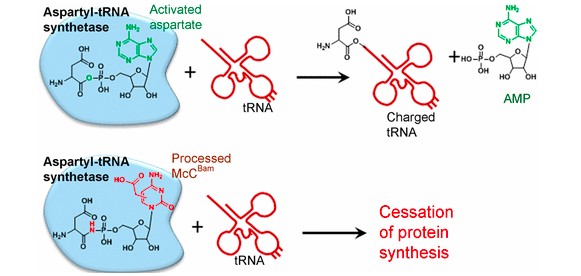Scientists from Skoltech and Institute of Gene Biology (Russian Academy of Sciences) in collaboration with their colleagues from Belgium, led by Skoltech Professor Kostantin Severinov, have described a new antibiotic that destroys bacterial cells using a Trojan-horse mechanism. The new substance was found in bacteria Bacillus amyloliquefaciens. New antibiotic is able to inhibit protein synthesis in bacterial cells and it has a few advantages over “Trojan-horses” previously studied. This study gives a new insight for the future development of novel-antibiotics.
Konstantin Severinov, head of the study, the director of Skoltech Center for Data Intensive Medicine and Biotechnology: “The focus of the new publication is a new antibiotic produced by bacterium Bacillus amyloliquefaciens that was first predicted by means of bioinformatics. Like microcin C, studied in our group before, the new compound acts through a Trojan-horse mechanism but has a unique chemical structure that allows the new drug to inhibit growth of cells that have acquired resistance to microcin C. These findings highlight the importance of DNA sequence mining for uncovering novel bioactive compounds and may lead to development of new antibacterial drugs in the future.”
Antibiotic resistance is one of the biggest problems in modern healthcare. Unfortunately, old antibiotics often become less effective against many bacteria. That’s why scientists actively perform new antibiotics search. One of such antibiotic is microcin C, a prototypical Trojan-horse antibiotic produced by some bacteria commonly found in the gut. Microcin C is an adenylated peptide, with the peptide component ensuring access of a toxic “warhead” to sensitive cells. Upon entry, the peptide is destroyed, releasing the “warhead” that inhibits protein synthesis and preventing bacterial growth.
The focus of this publication is a new Trojan-horse antibiotic produced by a soil bacterium Bacillus amyloliquefaciens. This new compound obtains several striking features, which set it apart from microcin C. The most important feature that it’s mechanism of action has few specific modifications that reduce the probability of the antibiotic resistance development.
Recently published work by researchers and Skoltech students from the laboratory of Professor Severinov expands the repertoire of antibiotics produced by bacteria. These findings lend themselves to the future development of novel-antibiotics, which may find inspiration in these natural mechanisms.
The results of the work were published in prestigious Journal of the American Chemical Society .
Contact information:
Skoltech Communications
+7 (495) 280 14 81

